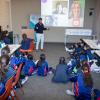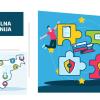International Day of Women and Girls in Science

From pioneering breakthroughs to life-changing innovations, the International Day of Women and Girls in Science is a moment to celebrate the extraordinary women who have shaped history with their contributions:
1911: Marie Skłodowska-Curie (Poland/France) was awarded the Nobel Prize in Chemistry for her groundbreaking research on radioactivity, leading to the discovery of radium and polonium.
1938: Lise Meitner (Austria/Sweden) co-discovered nuclear fission, a fundamental breakthrough in nuclear physics that paved the way for modern atomic science.
1980: Valerie L. Thomas (USA), a data scientist and inventor, patented the illusion transmitter, an innovation that influenced early digital imaging systems, including those used in NASA’s Landsat program.
1991: Ann Tsukamoto and her team patented a revolutionary method for isolating stem cells, transforming medical research and unlocking new possibilities for transplants and regenerative medicine.
2008: Françoise Barré-Sinoussi (France) was awarded the Nobel Prize in Physiology or Medicine for her pivotal role in identifying HIV as the cause of AIDS.
2012: Fabiola Gianotti (Italy) led the team that discovered the Higgs boson at CERN. In 2016, she made history as the first female Director-General of the organization.
Women from all over the world continue to contribute to advancement and development overcoming challenges and stereotypes. However, they are underrepresented in Europe’s digital sector as they are less likely to take up studies or apply for jobs in this field (Women in Digital Scoreboard 2024). Recognizing the importance of gender equality in digital, the Digital Decade policy programme set ambitious targets: Europe aims to employ at least 20 million ICT specialists by 2030, while actively encouraging women to enter the field.
The lack of girls and women in digital is a missed opportunity. While in 2023, women made up 52% of the 78.3 million people employed in science and technology in the EU, only 41% of scientists and engineers are female (European Parliament). These factors both slow down societal progress towards a fairer and more inclusive digital world and hold back economic growth both at the European level and globally.
About the International Day of Women and Girls in Science
In 2016, the United Nations designated 11 February, as the International Day of Women and Girls in Science. This day is dedicated to promoting gender equality in STEM fields and encouraging more women and girls to pursue careers in science and technology. Its goal is to break down the barriers and stereotypes that have historically limited women's participation in these areas. The theme for this year is "Charting progress to share the future: the best is yet to come." highlights the objectives of the day to promote gender equality, highlight achievements, inspire future generations, and advocate for inclusion.
Get inspired by role models in the digital world!
Explore our Digital Stories—exclusive conversations with inspiring women shaping the digital world. The Platform team sits down with inspiring female role models to share their journeys, challenges, and insights. Who knows? The next success story could be yours!
- Iulia Calaras: Technical Lead at Publicis Sapient
- Avanti Sharma: 18-year-old preteen technology specialist and head of Business Development at Workshop for Me
- Savvina Papadaki: Senior Digital Policy Manager at Samsung, and a proud alumna of the AI4Gov Master’s Program
Women4Cyber Network
The Digital Skills and Jobs Platform is proud to host the Women4Cyber Network, an extraordinary collaboration between the European Commission and the Women4Cyber Foundation, uniting cybersecurity enthusiasts and experts from various sectors and expertise levels. Who can join? Everyone with an interest in cybersecurity is welcome, including women, men, students, researchers, and professionals. We encourage all to be part of our community. As a member, you will have the opportunity to participate in initiatives, network with cybersecurity professionals, and engage in discussions to share your work and ideas.





